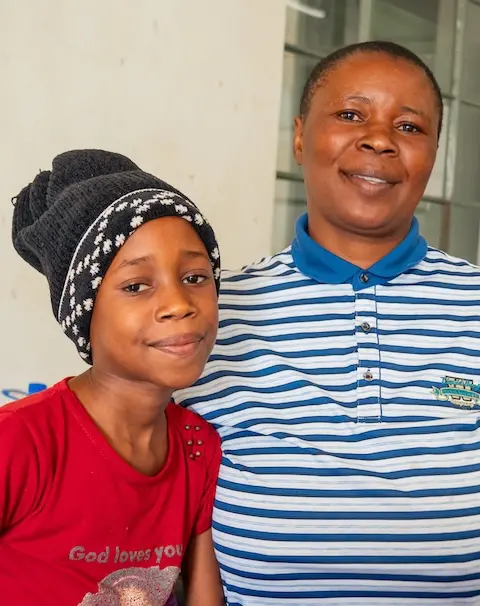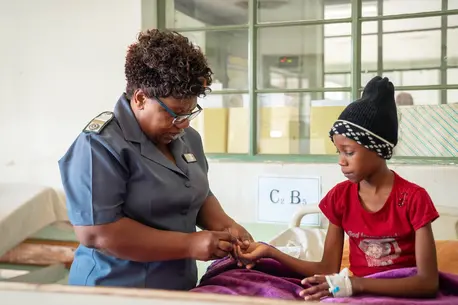UNICEF’s work to improve outcomes for children living with NCDs in Zimbabwe helped Kelly, 10, receive diabetes diagnosis and treatment
Source: In Zimbabwe, One Girl’s Story of Lifesaving Non-Communicable Disease Care | UNICEF USA
UNICEF’s work to improve outcomes for children living with NCDs in Zimbabwe helped Kelly, 10, receive diabetes diagnosis and treatment.
Childhood non-communicable diseases too often go undetected and untreated
Kelly sits up from her bed at Kadoma General Hospital in southwest Zimbabwe and greets her visitors with a broad smile. “I already feel much better,” the 10-year-old says.
Just a week earlier, Kelly arrived at the hospital fighting for her life. She’d had a severe blood glucose incident after experiencing steadily worsening symptoms that had been puzzling her parents.
For some time, her mother, Mabel, had noticed that Kelly was losing weight, growing thin and weak, and waking up at night extremely thirsty. She also suffered unusually frequent urination.
Hospital nurses immediately diagnosed Kelly with type 1 diabetes, a non-communicable disease (NCD), and put her on a treatment regimen that she will likely need to follow for the rest of her life. Kelly can’t wait to leave the hospital to return to school.
Kelly is lucky.
NCDs test the limits of national health systems in low- and middle-income countries
In addition to type 1 and type 2 diabetes, NCDs include chronic respiratory disease, cancer, high blood pressure, asthma, sickle cell disease and others. Many times, children suffer from NCDs that remain undetected and therefore untreated. Unmanaged NCDs deprive children of the therapies that can allow them to lead healthier lives and realize their full potential.
Non-communicable diseases in childhood arise from a combination of genetic, environmental and behavioral factors. Although many NCDs are preventable and treatable, around the world, nearly 1 million people under 20 perish from these diseases each year. NCDs disproportionately harm people in low- and middle-income countries and frequently require unavailable or unaffordable treatments.
In Zimbabwe, authorities say childhood NCDs are straining an already fragile health infrastructure.
“We still have communicable diseases, but we are now witnessing a geographic, demographic and epidemiological transition to non-communicable diseases,” said Dr. Justice Mudavanhu, Acting Director for Non-Communicable Diseases in Zimbabwe’s Ministry of Health and Child Care.
Caregivers and communities must bridge an information gap

Enhancing understanding of NCDs is key for social behavior change in Zimbabwe, where many people still prioritize traditional healing practices over modern medicine, believing common myths and misconceptions about the diseases.
For years, Mabel visited local healers and religious spirit mediums hoping for a miracle for Kelly. She was unfamiliar with type 1 diabetes and did not go to the hospital until the girl was in a life-threatening crisis.
Mary Thema, a clinical matron at Kadoma General Hospital, says Kelly’s case underlines this challenge. “We hope, going forth, the parents are at least going to get some rest from consultation from non-medical practitioners.”
Nurses at the hospital have educated Kelly and her mother on how to manage her disease at home, including making dietary and lifestyle modifications.
“She needs the support of the mother to remind her to take the medications, to see to it that she gets the correct diet, to see that she behaves in a responsible way,” says Thema. “As a kid, she might go and play and forget or she might decide she doesn’t want to have supper in the evening only to have problems later in the night.”
“We really want the caregivers to be on board because they are part of the treatment of non-communicable diseases.”
Video: Kelly’s journey to treating her non-communicable disease
UNICEF promotes a country-led approach to addressing non-communicable diseases
UNICEF and the Zimbabwe Ministry of Health and Child Care, with devoted partners, aim to overcome cultural beliefs that hinder NCD detection, prevention and screening through health system strengthening.
In Zimbabwe, raising awareness and reaching rural and tribal communities with health services poses substantial challenges. A comprehensive approach to health system strengthening includes training health care providers and putting programs in place to help change social behaviors around stigmatizing NCDs.
Dr. Mudavanhu credits UNICEF and partners for helping to make an impact across the country. “We are witnessing a high rise of NCDs as we are picking up on more cases, but the program is also helping to manage them and at the same time equip our health service delivery system.”
When undetected or treated incorrectly, NCDs can limit and harm children’s physical and cognitive development, education and economic opportunity their entire lives.
Kelly looks forward to going back to school. “I feel good; that’s why I now want to be a doctor so that I can also help other children when I grow up,” Kelly says. She counts mathematics among her favorite subjects.
Her mother, who had been by her bedside for the entire week, sheds tears of joy, and adds, “She really loves school, she is brilliant.”
With the support of UNICEF USA through the support provided by its donors, like Eli Lilly and Company, UNICEF is strengthening health systems across Zimbabwe and in several other low- and middle-income countries to give kids like Kelly the best chance to live happy and healthy lives.
This vital work is made possible by a donation from Eli Lilly and Company to UNICEF USA.
UNICEF does not endorse any company, brand, product or service.
The post In Zimbabwe, One Girl’s Story of Lifesaving Non-Communicable Disease Care appeared first on Zimbabwe Situation.


